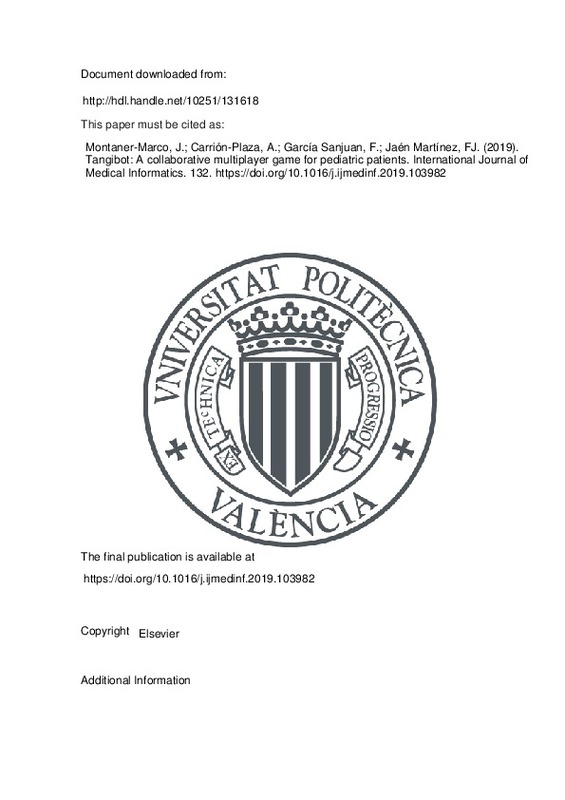JavaScript is disabled for your browser. Some features of this site may not work without it.
Buscar en RiuNet
Listar
Mi cuenta
Estadísticas
Ayuda RiuNet
Admin. UPV
Tangibot: A collaborative multiplayer game for pediatric patients
Mostrar el registro sencillo del ítem
Ficheros en el ítem
| dc.contributor.author | Montaner-Marco, Jorge
|
es_ES |
| dc.contributor.author | Carrión-Plaza, Alicia
|
es_ES |
| dc.contributor.author | García Sanjuan, Fernando
|
es_ES |
| dc.contributor.author | Jaén Martínez, Francisco Javier
|
es_ES |
| dc.date.accessioned | 2019-11-24T21:02:01Z | |
| dc.date.available | 2019-11-24T21:02:01Z | |
| dc.date.issued | 2019 | es_ES |
| dc.identifier.issn | 1386-5056 | es_ES |
| dc.identifier.uri | http://hdl.handle.net/10251/131618 | |
| dc.description.abstract | [EN] Background Previous research has studied the effects of games in pediatric wards, but none of it has focused on the impact of the hospital¿s school staff on the psychosocial state of the children nor on the gameplay itself. Objectives To present the Tangibot application and evaluate its impact on the children¿s psychosocial state in the short term and the impact of the teacher on their psychosocial state, communications and coordination during the activity. Methods A study was conducted in a hospital classroom with 20 participants, who participated twice in the game: one with the teacher playing along and another without her. An observational scale was used by two evaluators in order to assess the impact on the children. Results and conclusions The study revealed that the teacher has an impact on the children¿s communication and coordination procedures but has no impact on the psychosocial state of the participants. The teacher¿s impact was found to be positive about communications. Dialogue management significantly improves when the communication includes the teacher, which means speaking turns are observed more consistently. Information pooling also improves, and the participants ask the teacher more questions. Consensus is also reached more often and more easily, but this does not reflect on the performance, as the time management is evidently worse when the teacher is present, as is also the joint task orientation. On the other hand, it was found that the teacher does not have an impact on the psychosocial state of the participants during the game, and that it is the game itself which changes their state over time. In the case of affection, which reflects the participants¿ emotions of joy or boredom, their state improved significantly after a few minutes of play. The same thing occurred for physical activity, interest in the activity and interaction between peers, which increased in value in the first part of the game, although physical activity and interaction were reduced towards the end. No changes were found throughout the game in the number of complaints, nervousness or satisfied comments, which remained very low for all these aspects, showing that the game distracted them from their various symptoms. Based on these results, future work will explore the effects of gamification on the overall hospitalization perception, with special focus on the social opportunities during the hospital stay, to provide ways for the children to meet others during their treatment, to make the experience less painful and reduce their feelings of isolation. Some game strategies should also be evaluated to determine the ones that provide the best opportunities to improve the children¿s hospital experience. | es_ES |
| dc.description.sponsorship | This work is funded by the European Development Regional Fund (EDRF-FEDER) and supported by Spanish MINECO with Project TIN2014-60077-R-AR. The work of Jorge Montaner is supported by a national grant from the Spanish Ministry for Education (FPU17/03333). Special thanks to the staff of La Fe Hospital in Valencia who have collaborated in the experiment. | es_ES |
| dc.language | Inglés | es_ES |
| dc.publisher | Elsevier | es_ES |
| dc.relation.ispartof | International Journal of Medical Informatics | es_ES |
| dc.rights | Reserva de todos los derechos | es_ES |
| dc.subject | Pediatric socialization | es_ES |
| dc.subject | Children hospitalization | es_ES |
| dc.subject | Gamification | es_ES |
| dc.subject | Socialization | es_ES |
| dc.subject.classification | LENGUAJES Y SISTEMAS INFORMATICOS | es_ES |
| dc.title | Tangibot: A collaborative multiplayer game for pediatric patients | es_ES |
| dc.type | Artículo | es_ES |
| dc.identifier.doi | 10.1016/j.ijmedinf.2019.103982 | es_ES |
| dc.relation.projectID | info:eu-repo/grantAgreement/MECD//FPU17%2F03333/ | es_ES |
| dc.relation.projectID | info:eu-repo/grantAgreement/MINECO//TIN2014-60077-R/ES/SISTEMA DE TERAPIAS DE JUEGO BASADO EN SUPERFICIES INTERACTIVAS PARA LA MEJORA DEL IMPACTO EMOCIONAL DERIVADO DE LA HOSPITALIZACION PEDIATRICA/ | es_ES |
| dc.rights.accessRights | Abierto | es_ES |
| dc.contributor.affiliation | Universitat Politècnica de València. Departamento de Sistemas Informáticos y Computación - Departament de Sistemes Informàtics i Computació | es_ES |
| dc.description.bibliographicCitation | Montaner-Marco, J.; Carrión-Plaza, A.; García Sanjuan, F.; Jaén Martínez, FJ. (2019). Tangibot: A collaborative multiplayer game for pediatric patients. International Journal of Medical Informatics. 132. https://doi.org/10.1016/j.ijmedinf.2019.103982 | es_ES |
| dc.description.accrualMethod | S | es_ES |
| dc.relation.publisherversion | https://doi.org/10.1016/j.ijmedinf.2019.103982 | es_ES |
| dc.type.version | info:eu-repo/semantics/publishedVersion | es_ES |
| dc.description.volume | 132 | es_ES |
| dc.relation.pasarela | S\396130 | es_ES |
| dc.contributor.funder | Ministerio de Economía y Competitividad | es_ES |
| dc.contributor.funder | European Regional Development Fund | es_ES |
| dc.contributor.funder | Ministerio de Educación, Cultura y Deporte |







![[Cerrado]](/themes/UPV/images/candado.png)

